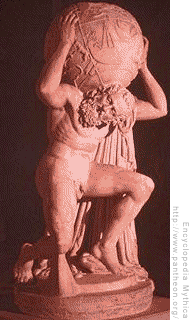| ATLAS Online | An online manual for using the ATLAS suite to analyse GEM data |
| ATLAS Online | An online manual for using the ATLAS suite to analyse GEM data |
"Here is Atlas holding heaven" - ancient inscription.

Atlas is a scion of the Titans, the Greek race of giants, and the son of Iapetus and
the nymph Clymene. He is the father of the Hesperides, the Hyades and the Pleiades. He was
also thought to be the king of legendary Atlantis ("Land of Atlas").
In the revolt of the Titans against the gods of the Olympic, Atlas stormed the heavens and
Zeus punished him for this deed by condemning him to forever bear the earth and the
heavens upon his shoulders. Hence his name, which means "bearer" or
"endurer".
To complete the eleventh of his twelve labors, Heracles had to obtain the golden apples of
the Hesperides, and he asked Atlas for help. Heracles offered to bear Atlas's burden in
his absence, when he went to retrieve the apples. Atlas agreed to perform the task readily
enough, since he did not plan on ever bearing that burden again. When Atlas returned with
the apples, Heracles requested him to assume the load for a moment, saying he needed to
adjust the pad to ease the pressure on his shoulders. After Atlas bore the world again,
Heracles walked off with the golden apples.
When Atlas refused to give shelter to Perseus, the latter changed Atlas into stone, using
Medusa's head. On the place where Atlas stood, now lie Mount Atlas (north-western Africa).
In art, Atlas is usually depicted as a man bearing a globe.
Last updated on 01 Sep 2000 by Alex Hannon (a.c.hannon@rl.ac.uk)